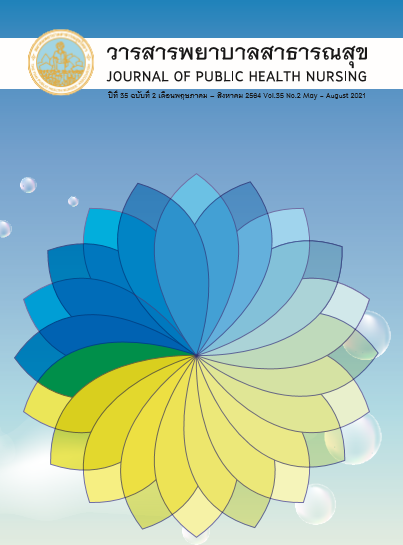Effects of E-learning on Self-Care Ability in Patients After Coronary Artery Bypass Graft surgery
Keywords:
E-learning, Self-care ability, Coronary artery bypass graft surgeryAbstract
Lack of knowledge and self-care ability in patients after coronary artery bypass graft (CABG) surgery can affect cardiac rehabilitation and increased risk of developing complications. The purposes of this Quasi-experimental research were to study the effects of e-learning on knowledge and self-care ability in patients after surgery. The sample was composed of 99 patients who underwent CABG surgery for the first time and divided to 49 patients in the control group and 50 patients in the experimental group by convenience sampling. The experimental group received an e-learning program delivered by video media via Internet at the 5th post- operative day before discharge. The education program included the comprehensive post-operative knowledge and appropriately practice for enhancing recovery at home. Data were collected by using the knowledge questionnaires before and after intervention and self-care ability questionnaires after 1-month post-operative. Data were analyzed by mean, standard deviation, independent t-test to test the difference on knowledge and self- care ability between 2 groups, paired t-test for test of the difference between before and after e-learning in each group.
The results revealed that the after e-learning, the mean scores of knowledge and self-care ability at 1-month post-operative in experimental group were significantly higher than those of the control group (p < 0.001).
The findings suggested that the comprehensive education program using e-learning is benefit to enhance knowledge and self-care ability and should be delivered to CABG patients by health care team members. The program could be replicated or modified to implement in other hospitals for better cardiac rehabilitation and post-op complication reduction.
References
World Health Organization. Cardiovascular diseases (CVDS) [Internet]. 2017 [cited 2021 March 17]. Available from: https://www.who.int/en/news-room/fact-sheets/detail/cardiovascular-diseases-(cvds).
Epidemiology Division, Department of Disease Control, Ministry of Public Health. [Internet]. 2019 [cited 2021 March 21]. Coronary Artery Disease (CAD) in 2019. Available from: https://ddc.moph.go.th/uploads/files/1081120191227084415.pdf.
Mansin A, lerdkittikulyotin S, Lerttraikul N, Asdornwised U, Thanakiatpinyo T, Tantiwongkosri K. The effect of education program on knowledge and self-care ability in patients undergoing coronary artery bypass grafting. Journal of Nursing Science Mahidol University 2016; 34(1): 17-26. (in Thai).
Statistical report 2017. Medical record and statistics Division, Department of Technology and information [Internet]. 2017 [cited 2021 February 11]. Available from: https://www.rajavithi.go.th/uploads/2019/02/stat2017PDF
Montrief T, Koyfman A, Long B. Coronary artery bypass graft surgery complications: A review for emergency clinicians. Am J Emerg Med 2018; 36(12): 2289-97. doi: 10.1016/j.ajem.2018.09.014.
Ruggeri K, Farrington C, Brayne C. A global model for effective use and evaluation of e-learning in health. Telemed J E Health 2013; 19(4): 312-21. doi: 10.1089/tmj.2012.0175
Bandura A. Self-efficacy: The exercise of control. New York: W.H. Freeman and Company; 1997.
Zarani F, Besharat MA, Sadeghian S, Sarami G. The effectiveness of the information - motivation - behavioral skills model in promoting adherence in CABG patients. J Health Psychol 2010; 15(6): 828-37. doi: 10.1177/1359105309357092.
Dupont WD, Plummer WD, Jr. PS: Power and Sample Size Calculation 3.1.2, September 8th, 2014.
Borzou SR, Amiri S, Salavati M, Soltanian AR, Safarpoor G. Effects of the first phase of cardiac rehabilitation training on self-efficacy among patients undergoing coronary artery bypass graft surgery. J Tehran Heart Cent 2018; 13(3): 126-31.
Mohsenipouya H, Majlessi F, Forooshani A, Ghafari R. The effects of health promotion model-based educational program on self-care behaviors in patients undergoing coronary artery bypass grafting in Iran. Electronic physician 2018; 10(1): 6255-64. doi: 10.19082/6255.
Gopaldas RR, Overbey DM, Dao TK, Markley JG. The impact of academic calendar cycle on coronary artery bypass outcomes: a comparison of teaching and non-teaching hospitals. J Cardiothorac Surg 2013; 8(1): 1-8. doi: 10.1186/ 1749-8090-8-191.
Varaei S, Shamsizadeh M, Cheraghi MA, Talebi M, Dehghani A, Abbasi A. Effects of a peer education on cardiac self-efficacy and readmissions in patients undergoing coronary artery bypass graft surgery: a randomized-controlled trial. Nurs Crit Care 2017; 22(1): 19-28. doi: 10.1111/nicc.12118.
Scott KM, Baur L, Barrett J. Evidence-based principles for using technology-enhanced learning in the continuing professional development of health professionals. J Contin Educ Health Prof 2017; 37(1): 61-6. doi: 10.1097/CEA.0000000000000146.
Curran V, Fleet L, Simmons K, Lannon H, Gustafson DL, Wang C, et al. Adoption and use of mobile learning in continuing professional development by health and human services professionals. J Contin Educ Health Prof 2019; 39(2): 76-85. doi: 10.1097/CEH.0000000000000243.
Ma L, Deng L, Yu H. The effects of a comprehensive rehabilitation and intensive education program on anxiety, depression, quality of life, and major adverse cardiac and cerebrovascular events in unprotected left main coronary artery disease patients who underwent coronary artery bypass grafting. Irish Journal of Medical Science 2020; 189(2): 477-88. doi: 10.1007/s11845-019-02129-x.
Habibzadeh H, Milan ZD, Radfar M, Alilu L, Cund A. Effects of peer-facilitated, video-based and combined peer-and-video education on anxiety among patients undergoing coronary angiography: randomised controlled trial. Sultan Qaboos University Medical Journal 2018; 18(1): 61-7. doi: 10.18295/squmj.2018.18.01.010.
Downloads
Published
How to Cite
Issue
Section
License
บทความที่ตีพิมพ์และแผนภูมิรูปภาพถือเป็นลิขสิทธิ์ของวารสารพยาบาลสาธารณสุข (Thai Public Health Nurses Association)







